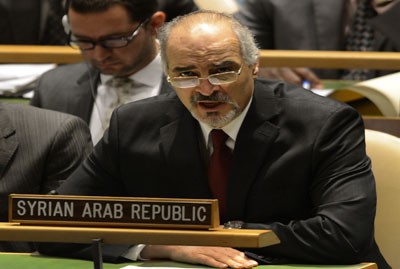NEW YORK,(ST)_ Syria’s Permanent Representative to the UN Dr. Bashar al-Jaafari stressed Syria ‘s full support to the global trend towards building an international community, free from dominance and based on UN Charter principles built on justice, equality and peace.
In a speech he delivered during UN General Assembly voting on the draft resolution on the adoption of the draft Arms Trade Treaty, al-Jaafar added : We have worked over the years like other UN Member States in order to reach a good treaty, and not for having an inapplicable treaty that will be used exclusively only as pressure on others in the future, as happened in other important decisions , pointing out that Syria was not against the treaty and has a belief that if it is completed as required it will be a major asset for the international community.
He added as saying, “we need a good treaty that we do not regret later that it is not politically exploited by some countries against each other.
AL- Jaafari said that Syria did not object to regulating the international arms trade, but opposed the draft because it did not refer to the arming of “non-state terrorist groups”.
Some of the countries behind the draft treaty, he said, were “fully engaged in supplying terrorist groups [in Syria] with all kinds of lethal weapons”.
Russia’s Permanent Representative to the UN Vitaly Churkin described as a significant shortcoming the lack of a clause in the draft treaty about banning the supply of weapons to non-state entities.
The assembly had heard from member-states’ ambassadors objecting to, or supporting, the draft.
The UN General Assembly has passed the first global arms trade treaty by 154 votes to three, with 23 abstentions.
Iran, North Korea and Syria had sought to block the treaty governing a trade worth some $70bn (£46bn) annually.
Russia, the world’s second-biggest major exporter, was among those states which abstained from the vote at the Assembly in New York.
The treaty prohibits states from exporting conventional weapons in violation of arms embargoes, or weapons that would be used for acts of genocide, crimes against humanity, war crimes or terrorism.
It also requires states to prevent conventional weapons reaching the black market.
Cuba’s Rodolfo Reyes Rodriguez said the draft contained “ambiguities” which gave it “serious limitations” and that it favoured the interests of arms exporters.
Last week, a UN treaty-drafting conference failed to reach consensus after objections from Syria, Iran and North Korea.
Iran said the treaty was full of flaws and loopholes and North Korea said it was unbalanced.
The draft was then sent to UN Secretary-General Ban Ki-moon who was asked on behalf of nations backing the treaty to put it to a vote in the General Assembly on Tuesday.
T. Fateh

